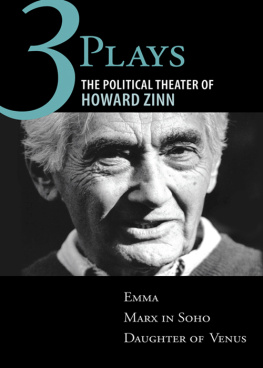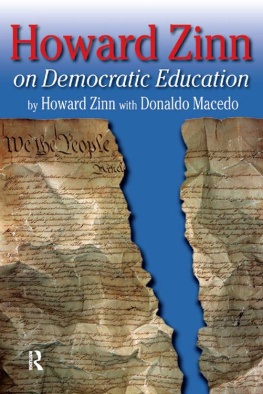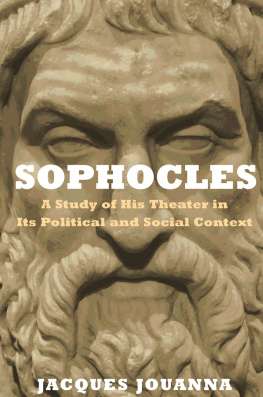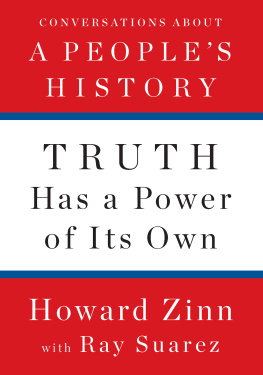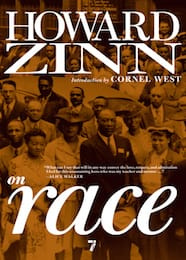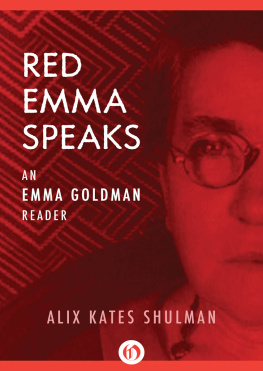
INTRODUCTION
Why would a historian move outside the boundaries of the discipline (refuse to be disciplined) and decide to enter the world of the theaterthat is, to write plays? I cant speak for othersthe historian Martin Duberman is the only one who comes to mind, having written the documentary play In White America during the early years of the civil rights movement.
In my case, it was something I had in mind for a long time, because even as I was writing history, my family was involved in the theater. In 1961, when I was teaching at Spelman College in Atlanta, my wife, Roslyn, was cast as Anna, the English schoolteacher, in a black production of The King and I. She went on to play a number of roles for Theater Atlanta, including the role of Miss Madrigal in Enid Bagnolds The Chalk Garden. When we moved to Boston, she was cast in Bertolt Brechts The Caucasian Chalk Circle at Harvards Loeb Theater (predecessor of the American Repertory Theater). In Atlanta, my daughter Myla was chosen, over sixty contenders, for the role of Anne Frank and was cited as Best Actress of the Year in 1962. My son Jeff worked as an actor and director in New York, then moved to Cape Cod and became artistic director of the Wellfleet Harbor Actors Theater (W.H.A.T.).
So I was left behind, to wander in libraries and engage in the solitary pursuit of writing history, while observing the rest of my family having fun in the theater. Always the longing was there, perhaps having begun as far back as when I was sixteen and saw my first play in a funky little theater in Manhattan.
It was a Federal Theater Project production of One Third of a Nation, getting its title from FDRs famous declaration I see one-third of a nation ill-housed, ill-clad, ill-nourished. My family fit that description, living in various dingy tenements in Brooklyn. As I sat on a wooden bench (could I expect more, having paid 17 cents for admission?) waiting for the play to begin in the darkened theater, I heard the sirens of fire engines, growing louder and louder, and then saw flames shooting up frighteningly from the stage, where one could make out a tenement building on fire. I soon realized it was all a fake but a marvelously exciting way to introduce the theme of the playpoor people made homeless by fire sweeping through wooden tenements.
That experience suggested to me, early on, the power of drama in conveying a message of social significance. It began a life-long fascination with the stage. When we lived in a low-income housing project in downtown Manhattan, my wife and I would scrape together some money to see Broadway plays. We could only afford the cheapest seats. Still, we were thrilled to see the original productions of A Streetcar Named Desire, Native Son, Death of a Salesman, All My Sons.
When we moved south, to live in the black community of the Atlanta colleges, and I became involved in the movement against racial segregation, I experienced the theater vicariously through my family. Moving north, my life centered around teaching history and politics at Boston University, but even more, around the struggle to end the war in Vietnam. Writing about war and civil disobedience, I had no chance to think about writing for the theater. But when the war in Vietnam ended, and I was no longer racing around the country for lectures and demonstrations against the war, I felt free to write my first play, Emma, about the outrageous feminist-anarchist Emma Goldman, her comrades, her lovers. I now experienced an excitement that could never be matched in the world of the university. I discovered that writing for the theater had a quality missing in the writing of books and articles. Those were solitary endeavors, but when you wrote a play it quickly became a collective experience.
As soon as you, the playwright, turned over your script to a director, it was no longer a lone creative act. Almost immediately, the play belonged to the director, the actors, the set designer, the lighting and costume people, the stage manager, as much as it did to you. And there was a passion binding all of you together in a collective effort to bring your words to the stage in the most dramatic, most compelling way possible. It was an emotional experience unlike anything I had ever known as a professor, as an author of historical works. I was going to be working with all these other people, intensely, in close quarters, with a warmth and affection foreign to academe. People arrived for rehearsal and hugged one another. It was not a scene one encountered in the university.
But would writing for the theater be as satisfying, for someone like me, whose life and writing had been concentrated on war, law, poverty, injustice, racism? Thinking about it, I concluded that neither form of social struggle could be considered superior. Each had its unique power. Writing historical and political works, I could introduce to my readers ideas and facts that might provoke them to examine anew the world around them, and decide to join the fray. Writing plays would zoom in on a few characters, and by getting the viewers to identify with them emotionally, move the audience in a visceral way, something not easily achievable in prosaic works of history and political philosophy.
A play, like any other form of artistic expression (novels, poetry, music, painting), has the possibility of transcendence. It can, by an imaginative reconstruction of reality, transcend the conventional wisdom, transcend orthodoxy, transcend the word of the establishment, escape what is handed down by our culture, challenge the boundaries of race, class, religion, nation. Art dares to start from scratch, from the core of human need, from feelings that are not represented in what we call reality. The French rebels of 1968 posted a slogan: Soyez realiste. Demandez limpossible (Be realistic. Demand the impossible.). Centuries earlier Pascal said: The heart has its reasons, which reason cannot know.
That is the goal, which not all art attains. And certainly, my writing of plays would fall short of the potential for an imaginative reconstruction of reality. But I would have something to strive for, something outside the disciplines of history and political philosophy. And, I concluded, especially after my first experience in theater, this would be more fun than the lone pursuit of history.
Emma was first performed in New York in 1977 at the Theater for the New City, and was directed by my son, Jeff Zinn. The following year, in Boston, it was directed by the Obie Award winner Maxine Klein, with an ensemble of talented performers who had been a successful improvisational group before they turned to the theater. Emma ran for eight months, the longest-running play in Boston in 1977. In the eighties it played in New York again, directed by Maxine Klein; then in London, at the Young Vic; and at the Edinburgh Festival, directed by Pauline Randall. In 1990, translated into Japanese, it was performed in Tokyo and other Japanese cities. More recently, in various translations, it has played in Germany, France, Spain, and Argentina.
In the early 1980s, I wrote my second play, Daughter of Venus, which was first performed in New York in 1984, directed by Jeff Zinn at the Theater for the New City, whose artistic directors, Crystal Field and George Bartenieff, were doing some of the most creative theater work in the city. Jeff Zinn directed it again the following year at the White Barn Theater in Norwalk, Connecticut. In 2008, the revised script had a reading at Kate Snodgrasss Boston Playwrights Theater, directed by David Wheeler, and the following year it had a full performance there and at Suffolk University in Boston, directed by Wesley Savick.

